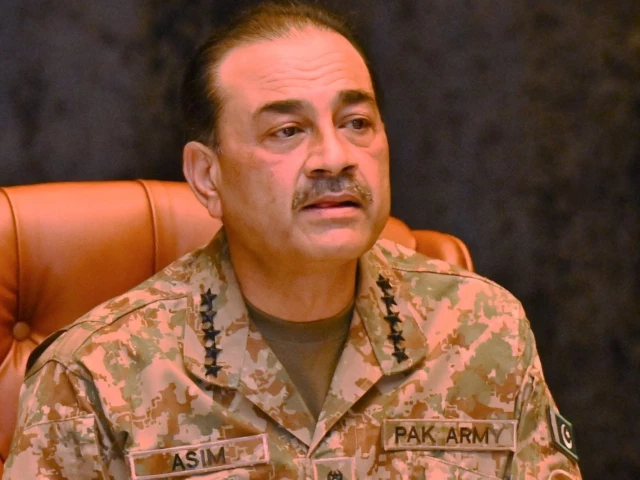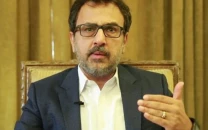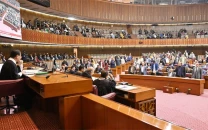Pakistan will never accept Indian hegemony, says Field Marshal Munir
Water is Pakistan’s red line; no compromise on rights of 240 million citizens: COAS

Pakistan will never accept Indian hegemony in the South Asian region, said Chief of Army Staff Field Marshal Asim Munir while reiterating his country’s stance on sovereignty amid an uneasy ceasefire between the two hostile neighbours following a recent military confrontation that threatened to spiral into a wider conflict.
According to the military’s media wing, the field marshal’s remarks came during a wide-ranging interaction with vice chancellors, academics, and senior faculty members, where he spoke about the crucial role of educators in shaping the country’s future generations.
However, his address centered on Pakistan’s unwavering stance on Indian Illegally Occupied Jammu and Kashmir (IIOJK) and growing concerns over India’s regional policies.
“Pakistan will never accept Indian hegemony,” Field Marshal Munir was quoted as saying by the ISPR as he underscored Islamabad’s resolve on key disputes, including Kashmir and transboundary water sharing. He listed water security as a national priority. “Water is Pakistan’s red line, and we will not allow any compromise on this basic right of 240 million Pakistanis,” he added.
The statement should be seen in the backdrop of India’s recent decision to "hold in abeyance" the Indus Waters Treaty (IWT), a 1960 World Bank-mediated agreement governing the distribution of the Indus river system’s resources. Under the treaty, Pakistan holds rights to the Indus, Jhelum, and Chenab rivers, while India controls the Ravi, Beas, and Sutlej rivers.
Read: Pakistan's military dismisses Indian water threat as ‘insane thinking’
Islamabad has warned that any attempt by India to divert or obstruct Pakistan’s share of water would be treated as “an act of war,” with a commitment to employ all elements of national power in response.
The army chief’s remarks came days after a military confrontation between the two nuclear-armed neighbours, triggered by “reckless and provocative missile strikes” by Indian warplanes on civilian infrastructure inside Pakistani territory. However, India was embarrassed in the escalation as six of its fighters jets, including three multibillion-dollar Rafales, were downed by Pakistan Air Force.
In retaliation for Indian aggression, Pakistan’s military launched Operation Bunyanum Marsoos (The Formidable Wall), targeting India’s air bases, air fields, ammunition depots, and missile stockpiles in areas along the entire Pakistan border.
Operation Bunyanum Marsoos was part of Marka-e-Haq (The Battle for Truth), the official name given to the broader conflict with India from April 22 to May 10. “In Marka-e-Haq, Allah Almighty helped Pakistan at every level.
“Marka-e-Haq is clear evidence that when a nation unites and stands like an iron wall, no power in the world can bring it down,” Field Marshal Munir said in Thursday’s interaction with the academia. “Divine help is granted to those nations that stand firmly for the truth and struggle collectively for their cause,” he added.
Read more: Field marshal thanks ‘political leaders for their foresight’ during conflict with India
The Pakistan-India military confrontation was triggered by a deadly rampage by gunmen on the meadows of Pahalgam, in the IIOJK, in which 26 tourists were killed. Delhi blamed the incident on Pakistan without a shred of evidence and without investigation and launched the reckless military misadventure disregarding Pakistan’s offer for help in impartial probe and global calls for resolving the matter diplomatically.
India’s gambit backfired as it brought the global spotlight back on Kashmir, the disputed Himalayan region which India stripped off its autonomous status in August 2019 through a constitutional amendment. “It is no longer possible to ignore or silence Kashmir on the global stage,” Field Marshal Munir said, reiterating that Kashmir remains a core national issue that cannot be sidelined.
“India must understand that Pakistan will never abandon Kashmir. There can be no compromise on this,” he said, adding that India's long-standing efforts to suppress the Kashmir issue have failed.
India – which accuses Pakistan of supporting terrorism – is seeking to externalise its internal problem. “Terrorism is India’s internal problem, stemming from rising oppression and prejudice against minorities, especially Muslims, while Kashmir is an international issue that cannot be equated with internal matters,” the army chief said.
Gen Munir also spoke about the situation in Balochistan where Baloch groups, officially dubbed Fitna al Hindustan, have unleashed a wave of terror. The terrorist elements active in Balochistan are proxies acting on behalf of foreign interests, particularly India, he said. “These terrorists are not Baloch. They are agents of disruption sponsored by India.”
Also read: Five terrorists killed in Balochistan IBOs: ISPR
The field marshal also called for reinforcing national unity, stressing the importance of institutional integrity and constitutional governance. “We must build a strong Pakistan where all institutions function according to law, without political pressure, and for the welfare of the people,” he said and urged rejection of any narrative aimed at weakening the state.
Praising the role of educators, he said, “Teachers are the greatest asset of Pakistan. The responsibility of character building of future generations rests with you.” He credited his own success to his parents and teachers, saying, “Whatever I am today is because of them.”
Participants in the session expressed their support for the armed forces, with one saying during the Q&A session: “This safe homeland exists because of the sacrifices of our armed forces.” The session ended on a note of unity and resolve, with attendees pledging to stand by Pakistan’s armed forces in defending the nation’s sovereignty and ideals.





















COMMENTS
Comments are moderated and generally will be posted if they are on-topic and not abusive.
For more information, please see our Comments FAQ